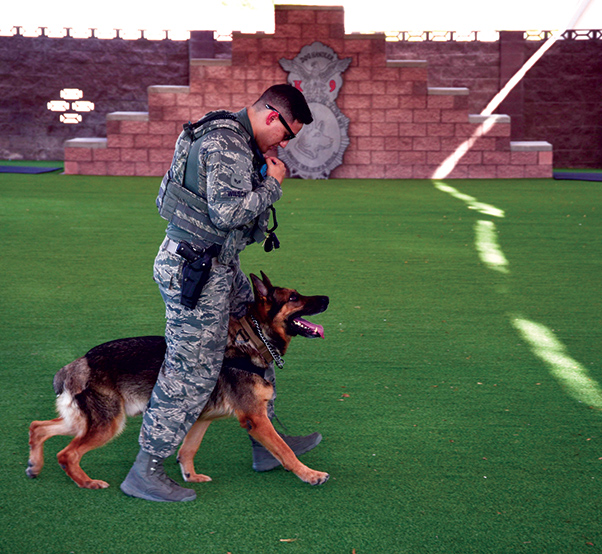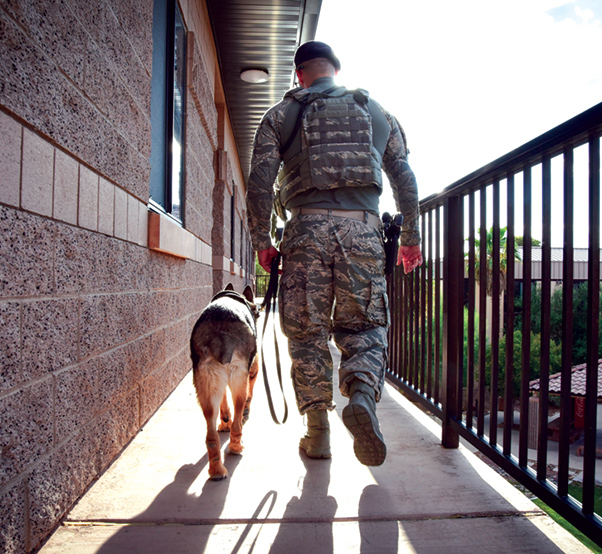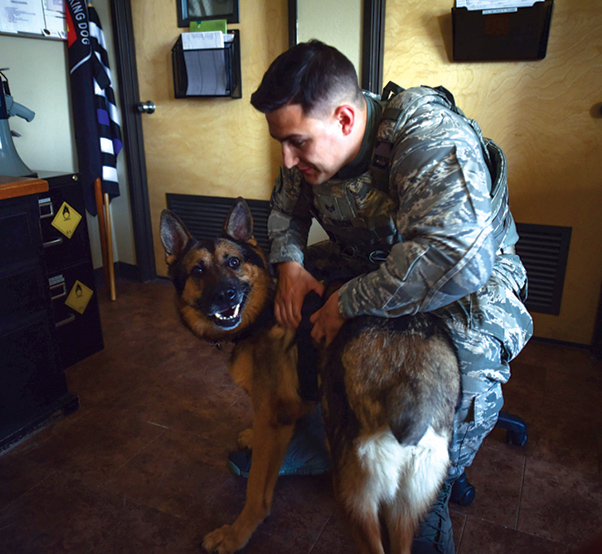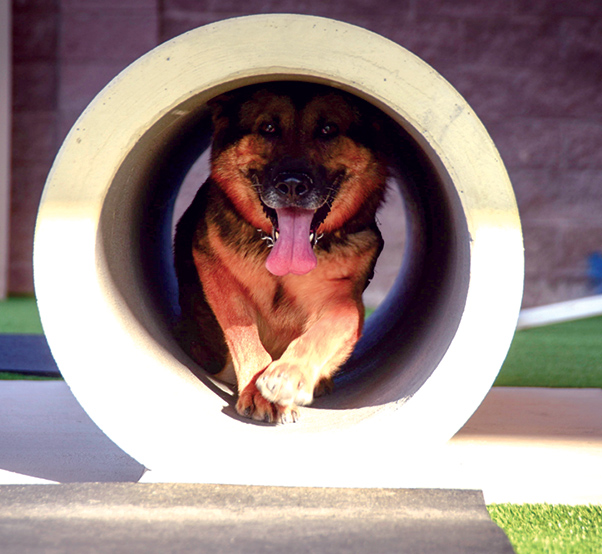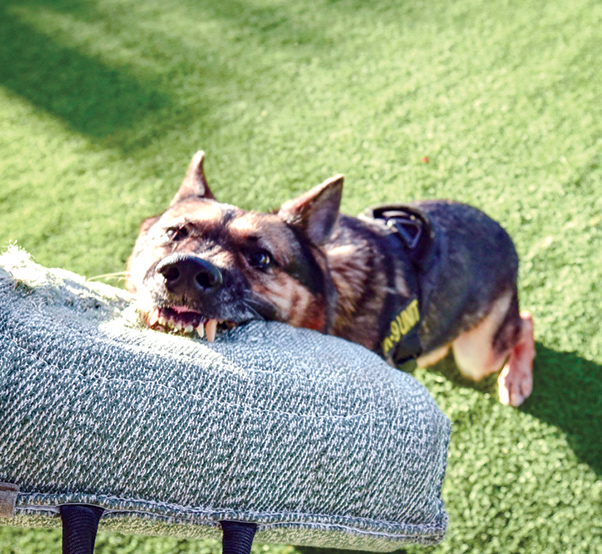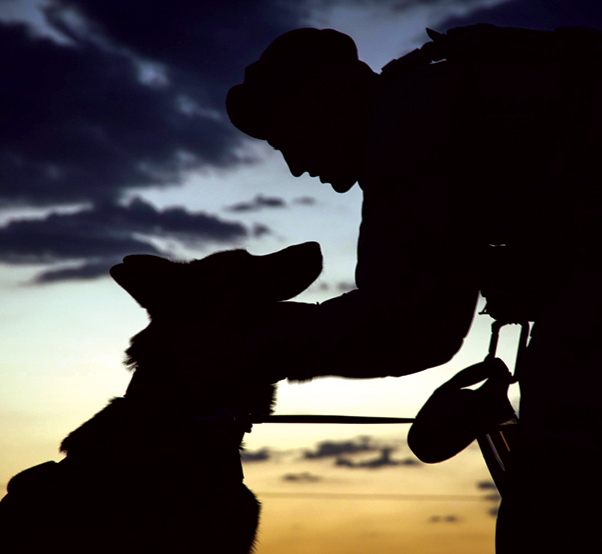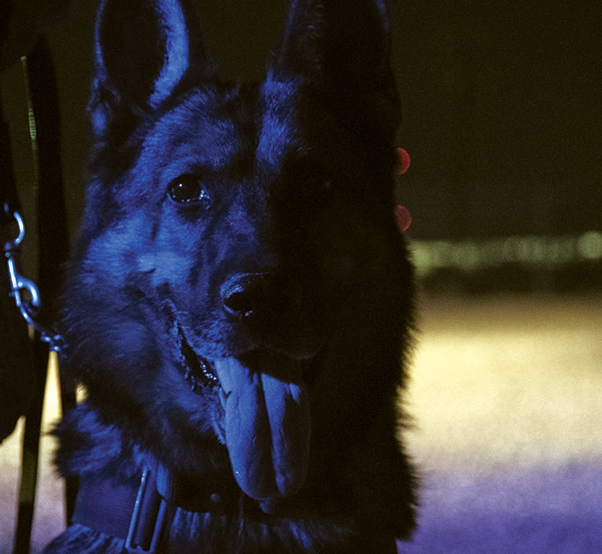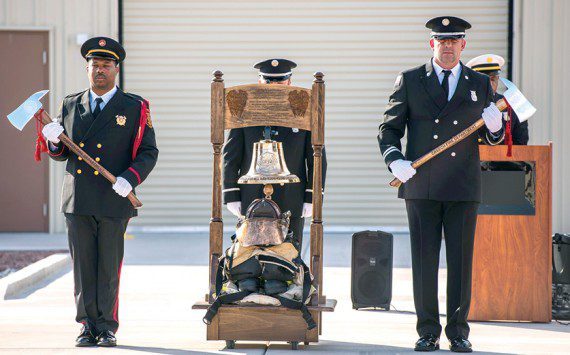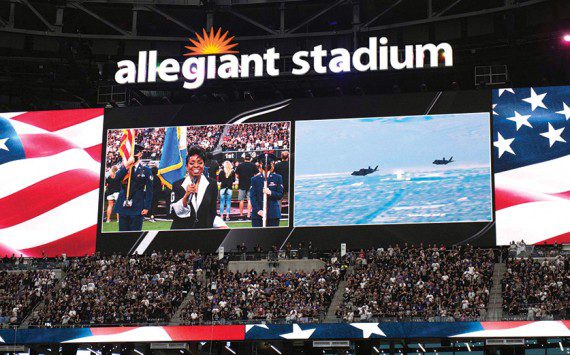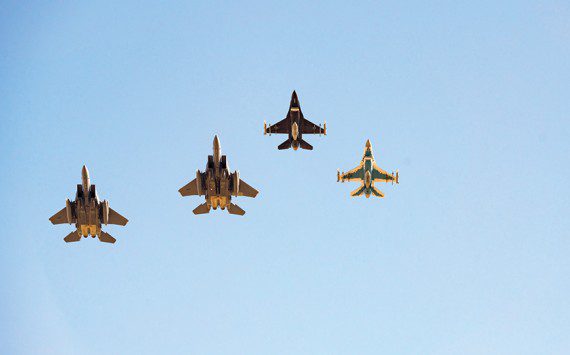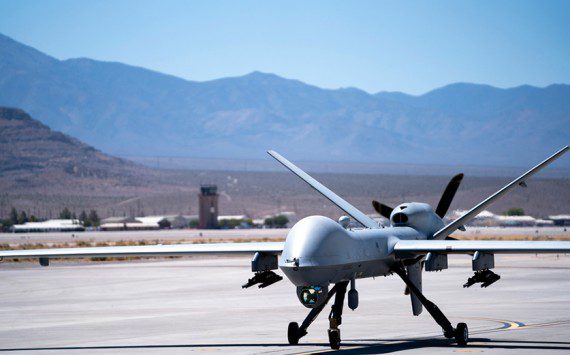Senior Airman Ryne Wilson, 99th Security Forces Squadron military working dog handler, and MWD Habo patrol the dorms at Nellis Air Force Base, Nev., Aug. 7, 2017. Wilson and Habo perform dorm patrols to ensure the safety and security of the Airmen living there.
In a small building near the outskirts of Nellis Air Force Base resides one of the Air Force’s most unique assets: military working dogs.
Habo, a 7-year-old narcotic detection K-9 is lying on the floor, when a familiar voice from across the room breaks the silence.
“Habo! Who’s a good boy?” asks the voice.
Curious, Habo lifts his head and perks his ears. Again, the voice playfully repeats.
“Who’s a good boy?”
Quickly, Habo rushes to the front door and finds his handler, Senior Airman Ryne Wilson, 99th Security Forces Squadron, who is ready begin his shift at the MWD kennel.
Excited to see his best friend, Wilson spoils Habo with a hug and a little praise to start the day.
Senior Airman Ryne Wilson, 99th Security Forces Squadron military working dog handler, praises MWD Habo, Aug. 7, 2017, at Nellis Air Force Base, Nev. Handlers are encouraged to constantly praise their dogs when they successfully complete a task, regardless of its level of difficulty.
Wilson discovered his knack for training dogs before joining the Air Force. In a single night, he taught his beagle half a dozen tricks with just a box of Triscuits. Therefore, when he walked into the local Air Force recruiter’s office, Wilson knew he needed to select a career field that would offer him the opportunity to be an MWD handler. He spent his first few years in security forces working the front gates and then the base defense operations center before getting an opportunity to train for his dream job.
Today, Wilson exercises that passion through one of the most unique partnerships in the Air Force.
“I have the best job in the Air Force, because I get to work with dogs for a living,” said Wilson. “I’m grateful for our trainers and kennel master because they really do test me, which makes me a better handler and Habo a better MWD.”
A mutual bond between a military working dog and a handler requires rigorous training, communication and performance under pressure to maintain safety and security across Nellis.
Wilson said the bond between a handler and his dog is crucial to mission success, because dogs have unique and powerful abilities to detect drugs and bombs as well as engage a fleeing suspect.
“K-9s bring a different aspect to law enforcement,” said Wilson. “Just having the dogs around is a psychological deterrent, and people will think twice about doing something they shouldn’t.”
Senior Airman Ryne Wilson, 99th Security Forces Squadron military working dog handler, trains with MWD Habo during their daily exercises Aug. 7, 2017, at Nellis Air Force Base, Nev. Handlers and their dogs train each day to maintain their skills and readiness for any situation. See pages 12 – 13 for story and additional photos.
When newly assigned K-9s and Airmen arrive, the kennel master and dog trainers evaluate their personalities and strengths to decide which dog is best suited for each handler, said Staff Sgt. Logan FitzGerald, 99th SFS MWD trainer.
FitzGerald said sometimes the handlers and dogs will get off to a rough start. Commands won’t be heard or given properly, or personalities won’t complement each other, making it difficult for the dog to obey the handler’s orders.
“If a handler doesn’t mix well with a dog, it’s very noticeable,” said FitzGerald. “They might be able to get the mission done, but they won’t exceed that — and we’re always trying to exceed the expectations.”
For the dog, it is difficult to obey the new handler they don’t fully trust; for the handler, it is difficult to creatively forge a bond to maintain the dog’s obedience. It doesn’t always go smoothly, and mistakes can bite back.
Habo, 99th Security Forces Squadron military working dog, crawls through a tube at Nellis Air Force Base, Nev., Aug. 7, 2017. Habo is primarily trained to detect narcotics.
“I’ve been bitten a few times in my career, but that’s just part of the job,” said FitzGerald. “If you don’t leave the K-9 career field with a few scars, you didn’t do it right.”
Sometimes building a relationship with a dog just comes down to the handler spending time with the dog and praising it as much as possible.
Wilson and Habo have been together for more than a year, and they began bonding immediately. They are often found walking patrols around base, running through the obstacle course or making their way around various areas on base. Like most dogs and their owners or handlers, Wilson and Habo are inseparable.
Their relationship is unique and suits each other well because they are constantly training to become more efficient at their jobs. They need to know that when their skills are put to the test, they can rely on each other to safely and successfully complete the task.
“It’s a privilege to work with Habo,” said Wilson. “I look forward to going to work every day because it’s always something new, which keeps Habo and I on our toes.”
Habo, 99th Security Forces Squadron military working dog, bites on a padded sleeve Aug. 7, 2017, at Nellis Air Force Base, Nev. MWDs are trained to pursue and bite suspects that pose an immediate threat.
Senior Airman Ryne Wilson, 99th Security Forces Squadron military working dog handler, praises MWD Habo during a patrol at Nellis Air Force Base, Nev., Aug. 7, 2017. Praising their dog for exhibiting good behavior is an exceptional way to help build a bond between the handler and their dog.
Habo, 99th Security Forces Squadron military working dog, pauses during a patrol around Nellis Air Force Base, Nev., Aug. 7, 2017. MWDs and their handlers patrol the outskirts of a base to ensure its safety and security.






